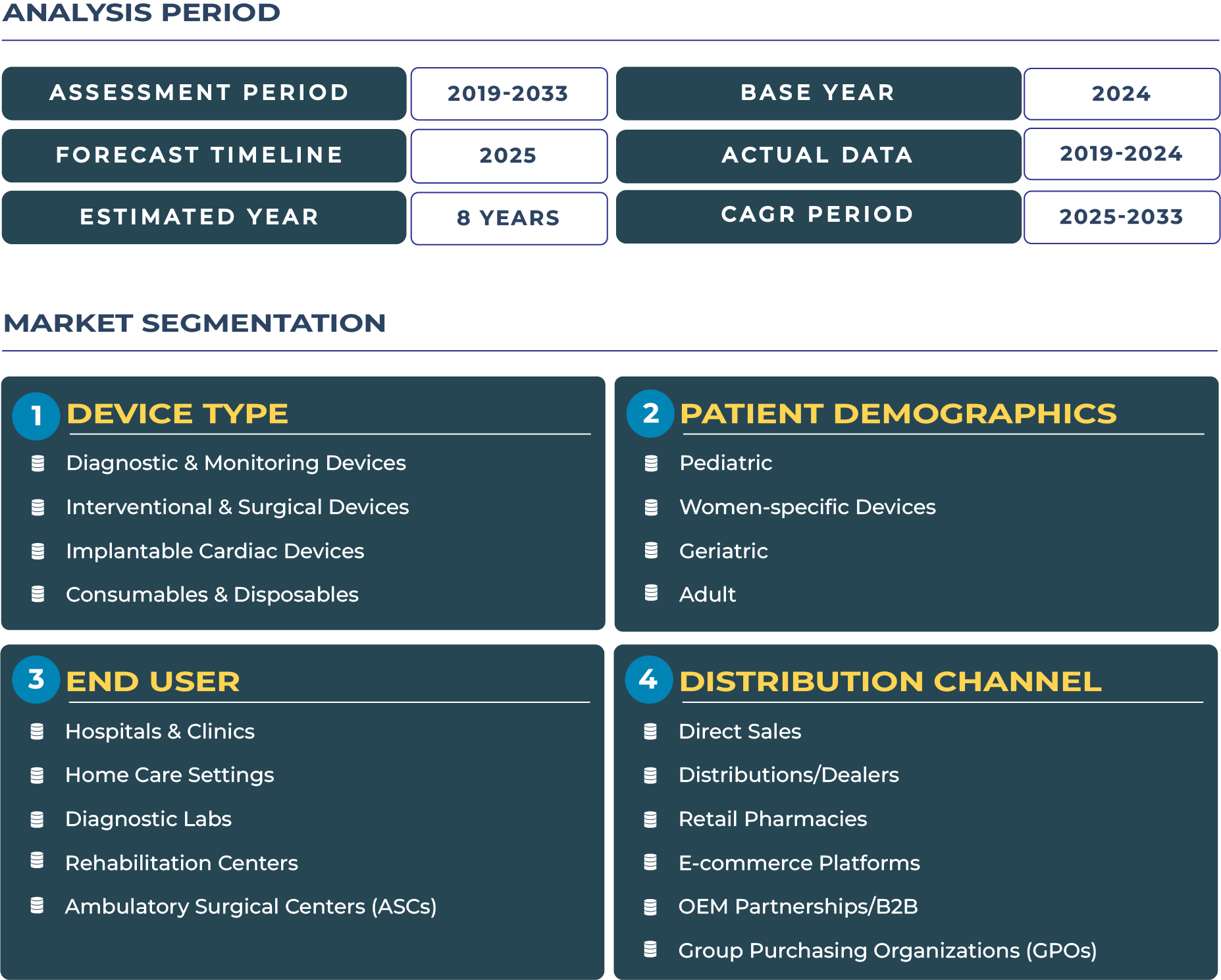Benelux Cardiovascular Devices Market: Cross-Border Innovation Driving Compact Market Growth
The Benelux Cardiovascular Devices Market is expected to reach USD 898.8 million by 2025 and expand further to USD 1,451.0 million by 2033, reflecting a healthy CAGR of 6.2% from 2025 to 2033, according to DataCube Research. This performance is driven by a combination of advanced hospital networks, the adoption of premium implantable and interventional devices, and increasing demand for digital monitoring tools. The Netherlands in particular is emerging as a cardiovascular R&D hub, while Belgium has positioned itself at the forefront of AI-driven registries and medical tourism. Luxembourg, despite its small size, plays a critical role in fostering insurer-driven innovation models. Together, the region’s healthcare ecosystems create a favorable environment for global cardiovascular device companies to test, refine, and scale innovations for Europe-wide distribution.
Benelux Cardiovascular Devices Market Outlook: Benelux as a Compact Yet Powerful Cardiovascular Hub for Cross-Border Healthcare and Innovation
The Benelux region—comprising Belgium, the Netherlands, and Luxembourg—stands as a compact but powerful hub for cardiovascular innovation. With high-income populations, world-class hospitals, and robust healthcare insurance systems, the region has carved a niche in advancing cardiovascular device adoption. A unique differentiator for Benelux is its emphasis on cross-border healthcare, enabling patients to benefit from shared medical expertise and collaborative research projects that transcend national boundaries. The governments of Belgium, the Netherlands, and Luxembourg have consistently prioritized digital health, hospital modernization, and sustainability pilots, making the region a testbed for advanced cardiovascular solutions. Innovations in diagnostic imaging, robotic-assisted surgery, and implantable devices continue to benefit from close collaboration between academia, medtech startups, and global corporations. These synergies highlight why the Benelux cardiovascular devices industry is not only stable but strategically positioned for sustainable long-term expansion despite its smaller market size compared to larger European peers.
Drivers & Restraints: Balancing High-Tech Growth with Structural Challenges
High-tech medtech hubs and collaborative healthcare systems accelerating adoption: The Benelux region benefits from world-renowned medtech hubs, with Eindhoven in the Netherlands recognized for life sciences and Belgium’s Leuven emerging as a leader in clinical research. These hubs provide fertile ground for introducing cardiovascular monitoring devices, interventional technologies, and robotic-assisted surgery platforms. The region’s high insurance penetration ensures reimbursement support for premium cardiovascular solutions, allowing patients to access advanced care without significant financial barriers. Furthermore, cross-border healthcare agreements within the European Union enable shared access to specialized cardiovascular centers, enhancing adoption of cutting-edge devices.
Small market size and regulatory complexity slowing growth: Despite strong fundamentals, the compact market size limits the absolute growth potential for cardiovascular devices in Benelux. While the per capita healthcare spend is among the highest in Europe, manufacturers often face challenges in justifying extensive R&D budgets due to limited patient pools. Regulatory delays linked to compliance with the EU Medical Device Regulation (MDR) further complicate market entry, disproportionately impacting smaller companies. Additionally, talent shortages in specialized cardiovascular care and device engineering can slow the pace of innovation, underscoring the need for coordinated workforce development policies across the three countries.
Trends & Opportunities: Hospital Automation, Robotics, and Premium Device Positioning
Hospital automation and hybrid surgical robotics shaping the next growth wave: Benelux hospitals are increasingly investing in automation solutions that streamline patient monitoring and improve efficiency in cardiovascular care pathways. The adoption of AI-driven imaging and robotic-assisted interventional procedures is gaining traction, particularly in university hospitals in Amsterdam, Rotterdam, and Brussels. This trend reflects the region’s preference for precision-based cardiac care that minimizes recovery time and enhances surgical outcomes. Wearable cardiac monitoring devices also enjoy widespread adoption, with insurers promoting their use as preventive tools.
Opportunities in cross-border trials and premium device positioning: Given its compact geography, the Benelux market is well-suited for multinational clinical trials and collaborative testing of cardiovascular devices. Opportunities exist for global firms to position premium implantable and diagnostic devices targeting affluent patient segments and well-funded hospitals. Luxembourg’s insurer-driven healthcare ecosystem offers potential for innovative reimbursement pilots, while Belgium’s focus on AI-based registries can support evidence generation for novel cardiovascular products. Furthermore, cloud-based health platforms are gaining relevance, opening opportunities for telecardiology services that connect Benelux hospitals with patients across Europe.
Competitive Landscape: Global Leaders and Local Innovators Shaping the Ecosystem
The Benelux cardiovascular devices sector combines the strength of global leaders with local innovation. Philips, headquartered in the Netherlands, remains a frontrunner, expanding its cardiac R&D hub in 2023 to focus on digital imaging and hybrid surgical technologies. Belgium launched its national AI cardiac registry in 2022, reinforcing the role of data-driven healthcare in device validation. Medtronic has also expanded clinical trials in the region since 2022, leveraging Benelux’s favorable regulatory and healthcare environment to advance implantable cardiac technologies. Local startups are complementing global efforts, specializing in niche monitoring devices and sustainable cardiovascular consumables. Collectively, these developments highlight the region’s ability to serve as both a strategic R&D hub and a premium adoption market for advanced cardiovascular technologies.







